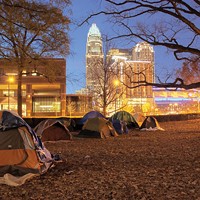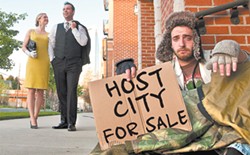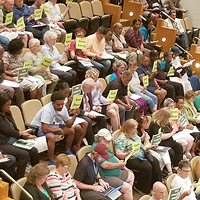Host City for sale: Did Uptown boosters sell a sanitized Charlotte to the DNC?
Turns out, the Queen City was an ironic choice
By Jason Cherkis and Rhiannon Fionn @rhifionnIf Whole Foods were to sell a city, the proposal might look like how local booster Dan Murrey pitches Charlotte. In his telling, this business-savvy city has the soul of a nonprofit — big on diversity, deep into renewables and deeper into do-gooders. Charlotte may be known as the "Wall Street of the South," but to Murrey, it's more like Mayberry 2.0.
Charlotte is not just a city, Murrey says, it's a "really great story."
"It is a very healthy community that really comes together and rallies around solving its own problems," Murrey says. "It's not that Charlotte is free of problems, or that it tries to sweep them under the rug. To the contrary. We have a history of really coming together and pitching in."
Murrey counts himself and his wife as contributing to that narrative. He moved to North Carolina's largest city 15 years ago for medical training and joined an orthopedic-surgery practice. He was then asked to serve on a state medical board. Within a month, his wife founded a theater group with three new friends and then later put together a homeless choir.
Last spring, Murrey became the executive director of the 2012 Democratic National Convention's host committee. His job: to sell Charlotte.
"It's more than just NASCAR and more than just banks," Murrey says.
Mayor Anthony Foxx amplifies on Murrey's sentiment. "We're a great new American city," Foxx says. "We're a city that has literally pulled itself up by its bootstraps."
Everyone with a convention lanyard or press pass will hear some variation of this Hands-Across-Charlotte tale when they arrive here in September. It is already being told and retold on the city's convention website through videos, blogs, press releases and posters.
In an emailed statement explaining why the Democratic National Convention Committee chose Charlotte as its host city, CEO Steve Kerrigan played up the city's modern facilities, its "compact center" and relatively easy-to-manage traffic. He also echoes Foxx, holding up Charlotte as a "dynamic, diverse and vibrant community that reflects America in the 21st century."
But that story doesn't acknowledge the true Charlotte, the one with double-digit unemployment, overflowing homeless shelters and pollution caused by hometown hero Duke Energy. In the age of Occupy Wall Street, it may turn out that what city boosters sell as a thriving bank town is an ironic choice for a Democratic National Convention.
THE IRONIES begin with the setting for President Barack Obama's closing-night speech: Bank of America Stadium.
Part of what brought Charlotte into the 21st century was finance, particularly Bank of America Corp., whose power is symbolized by its headquarters' iconic glass tower in Uptown. Yet the second-largest bank in the country's problems are well-known. Bank of America received a controversial $45 billion bailout during the financial crisis, has been deeply exposed by the foreclosure mess and ignited contempt recently when it tried to impose a $5 monthly debit-card fee on its consumers. Obama blasted the fee on ABC News: "You don't have some inherent right just to, you know, get a certain amount of profit, if your customers are being mistreated."
When the president takes to the podium at BofA's stadium, says U.S. Rep. Brad Miller, a Tar Heel Democrat, it will probably be "a moment of mild embarrassment" for his party. Obama's association with the stadium may even spotlight a weakness of his presidency, Miller adds. "One of the Obama administration's greatest vulnerabilities is that they have been seen, correctly, as too inclined to accommodate the banks."
Although the president criticized Bank of America during the debt-card fiasco, his supporters, particularly in Charlotte, have steadfastly defended the bank. This is what Foxx told WBTV during the uproar: "People who live in this community know how generous our financial institutions have been." In his interview with Creative Loafing, the mayor downplays any irony in the president's accepting his nomination at Bank of America Stadium. "Look, I don't think that matters," the mayor says. "We've got a great football stadium. We're going to have a great night there."
Murrey says: "We've got a great working relationship with the bank. We're very proud of the affiliation." Bank of America declined to comment.
Bank of America is not the only problematic corporate citizen involved in the political shindig Democrats are marketing as "the people's convention." Charlotte also is home to Duke Energy Corp., one of the largest utilities in the country. In fact, its CEO, Jim Rogers, is the DNC host committee's co-chairman and lead fundraiser.
But Duke Energy owns 10 of the 12 high-hazard coal-ash ponds in North Carolina and all of the five unlined coal-ash ponds near Charlotte. The two behind Duke's Riverbend plant in Gaston County drain directly into Charlotte's main drinking water reservoir, Mountain Island Lake. The company refuses to dredge and line the ponds, despite potential harm to, well, "the people."
Not surprisingly, Duke rejects the claim that its ash ponds are hurting the environment. Thomas C. Williams, the company's director of external relations, says the ponds not only are in compliance with state and federal regulations, but that "additional environmental monitoring done at the ponds also shows no indication of plant neighbors' groundwater being impacted by station operations."
CHARLOTTE counts Johnson & Wales University's move to Uptown in 2004 as one of its more noteworthy moments. City boosters say the famed culinary and hospitality school has helped ignite a vibrant restaurant scene by attracting and retaining talented chefs.
In mid-February, Sheron Young, 39, moved with her four kids from Georgia to attend the university. She had been accepted and was excited to finally enroll. "I've always wanted to be a chef," Young says. "It's been my dream, like, since I was about 10 years old. As my children have gotten older and, you know, they're kind of floundering on what they want to do, I decided maybe if I did what I wanted to do, then that would give them some [direction] to do what they want to do."
Young moved in with a cousin. But four days later, the cousin was evicted. Young and her children — ages 4, 8, 17 and 18 — ended up living at a hotel. After two weeks, they ran out of money. "Everything wasn't going as planned," says Justin, her 17-year-old.
The family was forced to move into the Salvation Army's women and children's shelter. Instead of taking classes on French sauces, Young and her 18-year-old daughter rotate between watching the 4-year-old and applying for jobs. Young estimates that she has filled out more than 100 applications. She says she's gone on five interviews so far without success.
"I still think Charlotte is great," Young says. "I think it's a beautiful city ... [But] the one thing that struck me about Charlotte is the number of homeless people that are here. I wasn't expecting that."
Charlotte's rise as a New South mecca created a thriving downtown. It did not, however, create a strong safety net. The city has seen a nearly 60 percent increase in homeless families since 2009, according to a study by the U.S. Conference of Mayors, a nonpartisan policy group comprised of mayors of large- and mid-size cities. In January, unemployment in the metro area was 10.4 percent, a percentage point higher than Atlanta's rate and well above the national average of 8.3 percent. Charlotte's rate has since fallen to 10 percent; Atlanta's has since fallen to 9 percent.
"We created a lot of jobs, but a lot of those jobs were $8 an hour," says Darren Ash, executive director for Charlotte Family Housing, a nonprofit that operates a supportive housing program for homeless families. "If you are a single mom with kids, if you have a low-paying job, you are already on the edge of homelessness to begin with."
Deronda Metz, director of social services for the Salvation Army in Charlotte, says its shelter for women and children, which can hold about 250, is normally full. Sometimes, residents have to sleep in the dining room or in the television room.
Much of the mayor's efforts to address the housing crisis have been through his Charlotte-Mecklenburg Coalition for Housing. But it has spent too much time having to sell the idea of affordable housing to the more conservative enclaves and has not produced enough results.
"I would tell you the coalition is just an advisory board," says coalition member Mike Rizer, an executive vice president at Wells Fargo. "We don't actually fund anything. We have tried to be a catalyst for the community around the issue of affordable housing. But at the end of the day, the government entities decide on funding."
Various charities and nonprofits have tried to fill the gap left by government. Beatrice Agbegbon, 48, says she put her name on the waiting list for subsidized housing in 2004. She and her two children ended up going through Ash's Charlotte Family Housing program and eventually got a house through Habitat for Humanity in 2011. She's not sure what she'd be doing now without that private support. "I probably would have sunk back into depression," she says, "which would have brought an onset of drug use again."
Agbegbon now works as a parking attendant making $8.50.
FRED WILLIAMS lives in lot No. 15 of a run-down, unnamed trailer park near the airport, 3.7 miles from where Obama will give his acceptance speech. Williams says he eats out most days. The O'Yeah Carry Out is about 20 feet away from his home, but it's only open six days a week. "There ain't nothing around here," he says when asked where he buys his groceries. "The only thing we've got is Walmart, but you have to take a bus for that — $1.75 coming and going — and they're about to raise that another quarter."
Williams lives in one of Charlotte-Mecklenburg's 60 food deserts, as identified by a 2010 UNC Charlotte Department of Public Health Sciences study commissioned by the county. First lady Michelle Obama highlighted food deserts while on tour for her Let's Move! anti-obesity campaign in October 2011.
"In so many neighborhoods, if people want to buy a head of lettuce or a salad or some fruit for their kid's lunches, they have to take two or three buses, maybe pay for a taxicab, in order to do it," she said at a Chicago Walgreens following a mayor's summit on food deserts.
Elizabeth Racine, assistant professor at UNC Charlotte's Department of Health and Human Services, describes food deserts as "a community or small neighborhood identified as low income and as not having a full-service food store" where people can buy healthful items. The Centers for Disease Control reports that a quarter of Mecklenburg County's population is obese; according to the UNC Charlotte study, people in food deserts are more likely to be obese, have diabetes and heart disease, and die a premature death.
John Autry, one of nine Democrats on Charlotte's city council, says the city is trying to improve the situation. He cites grants and the lowering of restrictions that prevent farmers markets from accepting food stamps. Plus, he says, "The city's Economic Development Office is at work to bring a grocer to the West Boulevard area" — Williams' part of town.
Meanwhile, citizens like Ryan Mitchell, founder of Cooks Community Garden, are providing relief. Mitchell and other volunteers take a mobile farmers market "into low-income communities where grocery stores refuse to build stores."
As Williams' cousin, Shun Curry, puts it, "The convenience stores aren't even convenient around here."
FOR CHARLOTTE residents, nothing will be convenient during convention week. The city is essentially renting itself out to the Democratic elite. The bid process required Foxx and Co. to reserve more than 150 restaurants and other venues, major hotels, museums and public parkland for convention-goers. If you don't have a ticket to Obama's closing-night speech, don't bother going downtown.
"We need to make sure everyone coming to town has what they need," says Suzi Emmerling, the host committee's press secretary. Perhaps the ultimate irony is that her welcoming attitude fits right into Charlotte's Mayberry narrative.
But Foxx is betting that the convention's impact will extend beyond that week and maybe actually address the serious issues Charlotte faces. He laid out a series of legacy projects that include decreasing the business district's carbon footprint, tackling obesity and increasing diversity in the financial district. The mayor wants, he said, for the convention to have "tangible outcomes."
"Any city in a globally competitive economy has to seek the competitive advantages that it can," Foxx says, "and this convention, for us, is a competitive advantage."
------------------------Jason Cherkis is a Huffington Post reporter and researcher based in Washington, D.C.; Rhiannon Fionn is a Charlotte-based CL contributor. This cover story is part of a Democratic National Convention-related media partnership between the Huffington Post and Creative Loafing.
Speaking of...
Latest in DNC CL + HuffPost
More by Rhiannon Fionn
More by Jason Cherkis
-

Forward thinkers: DNC upgrades activists' game
Aug 30, 2012 -

Unions: Labor Day Parade is being snubbed by city
Jun 21, 2012 - More »
Calendar
-

NEW WINDOW GALLERY-Pat Rhea-ACRYLIC PAINTINGS-April 05-30 2024 VALDESE, NC 28690 @ New Window Gallery/Play It Again Records
- Through April 30, 12 p.m.
-

TheDiscountCodes
-

"Blood Residue Analysis of Paleoamerican Stone Tools in the Carolinas" @ Native American Studies Center
- Fri., April 26, 12-1 p.m.
-

Brightfire Music and Arts Festival @ GreenLife Family Farms
-

ARTS RENAISSANCE, a GALA supporting the ARTS in South Carolina @ the Columbia Museum of ART
-
5 Online Player Communities to Join in Michigan
-
A beginners guide to online sports betting in the US
-
I Changed my Sex. Now What?
Scott Turner Schofield's rapid transit to a new identity
















